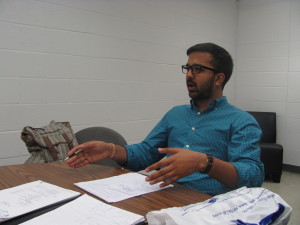
Raj Meheshwari sat down with The Knight News editors to discuss his plans for Queens College.
Every April, Queens College students cast their votes to decide which candidates will lead the Student Association.
After a particularly heated election between the Students for Change and Independent Alliance, Raj Maheshwari, SFC, officially stepped into office on June 1 as President of the Student Association.
Five months later, Maheshwari sat down with The Knight News team to discuss the successes, struggles and aspirations of his administration.
The transition into presidency was a smooth one for the 20-year-old corporate finance major.
“I’m fortunate enough to be surrounded by a team of people who carried over from last year’s administration and really knew the ropes,” Maheshwari said. “Technically I was part of last year’s administration.
Before taking the reigns as SA President, Maheshwari trained closely with former SA President Matthew Louie. He also served as public relations chairman last year.
“Matt did a great job of teaching me the ins and outs of being student body president,” Maheshwari said.
While the common perception of the president’s duties includes mandating budgets, approving clubs and planning student activities, Maheshwari views his position as a chance to make long lasting changes on campus.
The first step in initiating those changes is to realize what works and what doesn’t, Maheshwari said.
Specifically he referred to the Student Association using marketing tactics like free t-shirts and pizza to get students to attend events.
“It’s kind of like trying the same formula and expecting a different answer,” Maheshwari said. “You can tweak it and put in different numbers, but it’s not really going to get you anywhere.”
In an effort to avoid repeating unsuccessful methods, Maheshwari researched other schools to find out how their students events operate.
At Baruch College, a CUNY school located in Manhattan, multiple clubs often sponsor individual events, which increases attendance and adds a dynamic of unity between organizations.
“Every flyer at Baruch had two dozen club logos on it,” Maheshwari said. “It shocked me.”
Baruch has a very limited amount of space on their urban campus, Maheshwari said. However, their events are often packed, with over 300 people in attendance.
“They have that idea of inclusiveness… the idea of everyone coming together for one main goal. And that’s what I didn’t see here,” Maheshwari said.
Maheshwari would like to create a greater sense of unity between organizations on campus. One idea is to create a Student Association website that would serve as a database for clubs and school organizations. This would enable students to find out what events are happening on campus with the student government as a backbone, Maheshwari said.
“Every single club would have a page they could customize the way they want to, updated every semester,” Maheshwari said. “It would be something where everyone could connect under one main portal.”
Maheshwari considers this project to be one of the most achievable on his administration’s agenda.
Other goals, such as building renovations, have already been achieved. Renovations in the Agora Café and the SA Diner lounge were recently completed while new additions include a unisex bathroom and an ADA wheelchair accessible bathroom. Future renovations are planned for the Student Union Basement.
This progress may combat doubts many students had earlier this year regarding the distribution of funding.
A few weeks before the April election, Queens College Secrets, an anonymous Facebook page, “leaked” an annotated copy of the SA budget. An anonymous poster criticized the SA for spending a large amount of funds on t-shirts, formals, decorations and office supplies.
Although many students were surprised to learn how money was being spent, the documents were always public record, Maheshwari said.
“None of that would have been on our budget if we weren’t allowed to do it,” Maheshwari said. “You will never be able to please everyone.”
However, Maheshwari does hope to somehow make QC more than just a school to the students. His administration recognizes that they will always face the challenges of being a commuter school. That is why it is important to think outside the box, Maheshwari said. He would encourage new students to try a little bit of everything that the college has to offer.
“What are you doing to invest in yourself? No one is going to care what your GPA is out there in the real world,” said Maheshwari. “There is no difference between someone who graduated from here than someone who graduated from NYU. It’s what you make out of it.”














